BSC Business Management: Business Law Assignment - Semester 1, 2021/22
VerifiedAdded on 2023/06/09
|6
|2210
|445
Homework Assignment
AI Summary
This assignment delves into the intricacies of UK business law, providing a comprehensive overview of its various facets. It begins by defining law within the UK context, emphasizing the role of the Monarch and Parliament in the legislative process. The assignment then explores the two main classifications of UK law: private and public law, detailing their characteristics and scope. Furthermore, it identifies and explains the three distinct legal systems within the UK: England and Wales, Northern Ireland, and Scotland. The assignment also examines the principal sources of law in the English legal system, including legislation and case law, outlining their hierarchy and characteristics. It further discusses the impact of these laws on multilingual organizations, highlighting how primary and secondary legislation, as well as case law and parliamentary conventions, influence business operations. The assignment concludes by focusing on the law of tort, explaining its features and illustrating its direct impact on commercial organizations. The assignment provides a detailed analysis of the UK legal framework and its implications for businesses, particularly those operating in a multilingual environment.
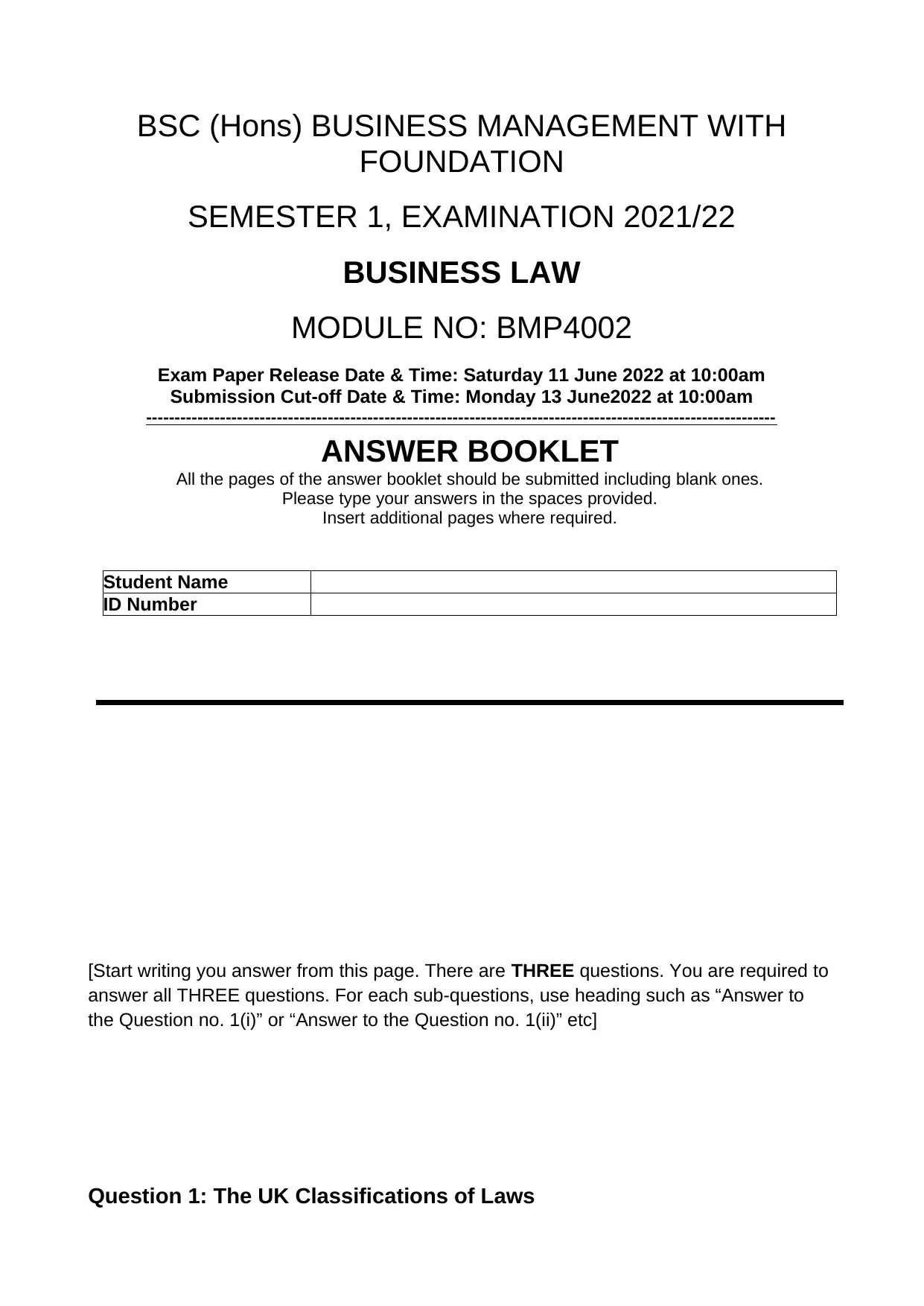
BSC (Hons) BUSINESS MANAGEMENT WITH
FOUNDATION
SEMESTER 1, EXAMINATION 2021/22
BUSINESS LAW
MODULE NO: BMP4002
Exam Paper Release Date & Time: Saturday 11 June 2022 at 10:00am
Submission Cut-off Date & Time: Monday 13 June2022 at 10:00am
---------------------------------------------------------------------------------------------------------------
ANSWER BOOKLET
All the pages of the answer booklet should be submitted including blank ones.
Please type your answers in the spaces provided.
Insert additional pages where required.
Student Name
ID Number
[Start writing you answer from this page. There are THREE questions. You are required to
answer all THREE questions. For each sub-questions, use heading such as “Answer to
the Question no. 1(i)” or “Answer to the Question no. 1(ii)” etc]
Question 1: The UK Classifications of Laws
FOUNDATION
SEMESTER 1, EXAMINATION 2021/22
BUSINESS LAW
MODULE NO: BMP4002
Exam Paper Release Date & Time: Saturday 11 June 2022 at 10:00am
Submission Cut-off Date & Time: Monday 13 June2022 at 10:00am
---------------------------------------------------------------------------------------------------------------
ANSWER BOOKLET
All the pages of the answer booklet should be submitted including blank ones.
Please type your answers in the spaces provided.
Insert additional pages where required.
Student Name
ID Number
[Start writing you answer from this page. There are THREE questions. You are required to
answer all THREE questions. For each sub-questions, use heading such as “Answer to
the Question no. 1(i)” or “Answer to the Question no. 1(ii)” etc]
Question 1: The UK Classifications of Laws
Paraphrase This Document
Need a fresh take? Get an instant paraphrase of this document with our AI Paraphraser
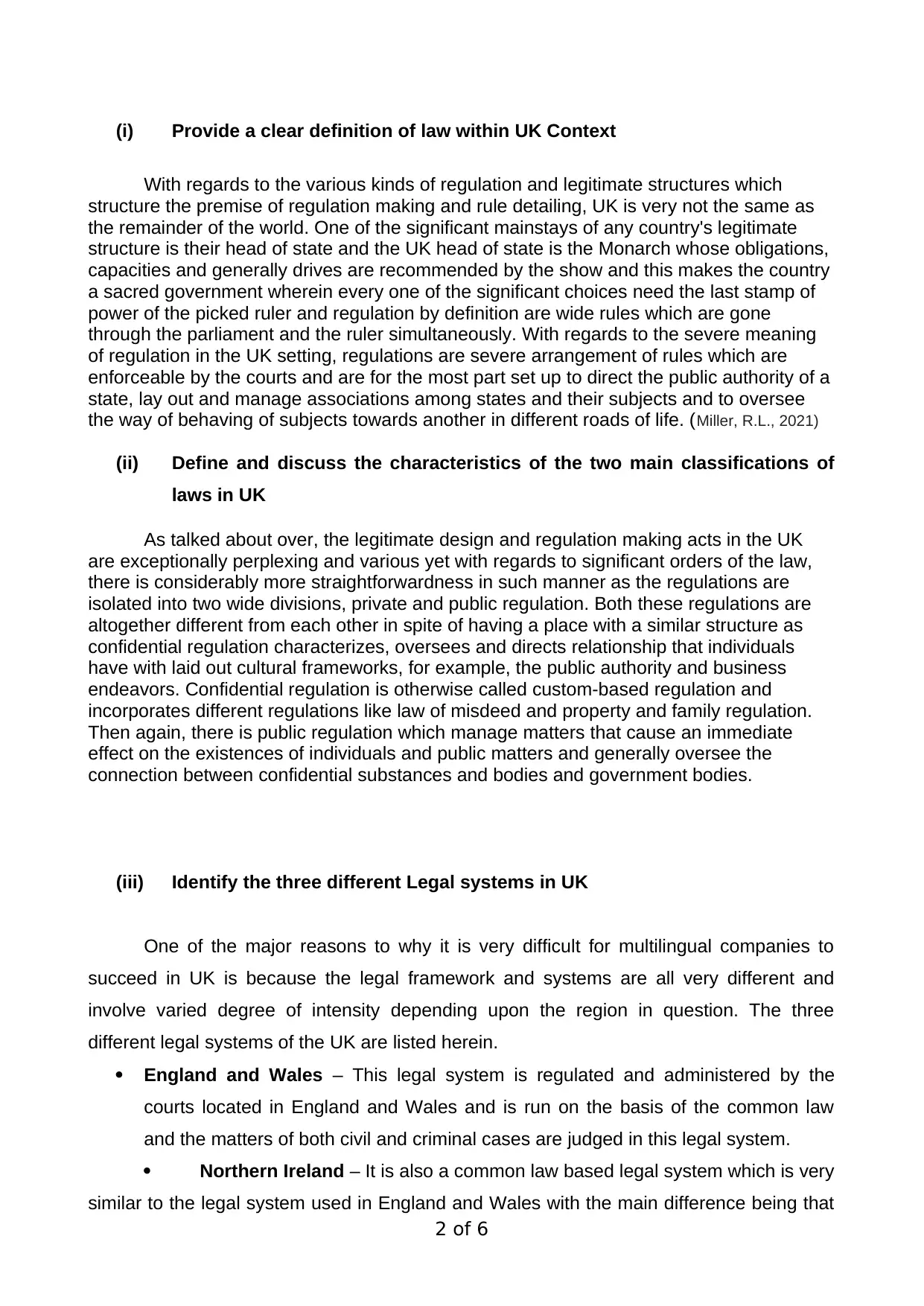
(i) Provide a clear definition of law within UK Context
With regards to the various kinds of regulation and legitimate structures which
structure the premise of regulation making and rule detailing, UK is very not the same as
the remainder of the world. One of the significant mainstays of any country's legitimate
structure is their head of state and the UK head of state is the Monarch whose obligations,
capacities and generally drives are recommended by the show and this makes the country
a sacred government wherein every one of the significant choices need the last stamp of
power of the picked ruler and regulation by definition are wide rules which are gone
through the parliament and the ruler simultaneously. With regards to the severe meaning
of regulation in the UK setting, regulations are severe arrangement of rules which are
enforceable by the courts and are for the most part set up to direct the public authority of a
state, lay out and manage associations among states and their subjects and to oversee
the way of behaving of subjects towards another in different roads of life. (Miller, R.L., 2021)
(ii) Define and discuss the characteristics of the two main classifications of
laws in UK
As talked about over, the legitimate design and regulation making acts in the UK
are exceptionally perplexing and various yet with regards to significant orders of the law,
there is considerably more straightforwardness in such manner as the regulations are
isolated into two wide divisions, private and public regulation. Both these regulations are
altogether different from each other in spite of having a place with a similar structure as
confidential regulation characterizes, oversees and directs relationship that individuals
have with laid out cultural frameworks, for example, the public authority and business
endeavors. Confidential regulation is otherwise called custom-based regulation and
incorporates different regulations like law of misdeed and property and family regulation.
Then again, there is public regulation which manage matters that cause an immediate
effect on the existences of individuals and public matters and generally oversee the
connection between confidential substances and bodies and government bodies.
(iii) Identify the three different Legal systems in UK
One of the major reasons to why it is very difficult for multilingual companies to
succeed in UK is because the legal framework and systems are all very different and
involve varied degree of intensity depending upon the region in question. The three
different legal systems of the UK are listed herein.
England and Wales – This legal system is regulated and administered by the
courts located in England and Wales and is run on the basis of the common law
and the matters of both civil and criminal cases are judged in this legal system.
Northern Ireland – It is also a common law based legal system which is very
similar to the legal system used in England and Wales with the main difference being that
2 of 6
With regards to the various kinds of regulation and legitimate structures which
structure the premise of regulation making and rule detailing, UK is very not the same as
the remainder of the world. One of the significant mainstays of any country's legitimate
structure is their head of state and the UK head of state is the Monarch whose obligations,
capacities and generally drives are recommended by the show and this makes the country
a sacred government wherein every one of the significant choices need the last stamp of
power of the picked ruler and regulation by definition are wide rules which are gone
through the parliament and the ruler simultaneously. With regards to the severe meaning
of regulation in the UK setting, regulations are severe arrangement of rules which are
enforceable by the courts and are for the most part set up to direct the public authority of a
state, lay out and manage associations among states and their subjects and to oversee
the way of behaving of subjects towards another in different roads of life. (Miller, R.L., 2021)
(ii) Define and discuss the characteristics of the two main classifications of
laws in UK
As talked about over, the legitimate design and regulation making acts in the UK
are exceptionally perplexing and various yet with regards to significant orders of the law,
there is considerably more straightforwardness in such manner as the regulations are
isolated into two wide divisions, private and public regulation. Both these regulations are
altogether different from each other in spite of having a place with a similar structure as
confidential regulation characterizes, oversees and directs relationship that individuals
have with laid out cultural frameworks, for example, the public authority and business
endeavors. Confidential regulation is otherwise called custom-based regulation and
incorporates different regulations like law of misdeed and property and family regulation.
Then again, there is public regulation which manage matters that cause an immediate
effect on the existences of individuals and public matters and generally oversee the
connection between confidential substances and bodies and government bodies.
(iii) Identify the three different Legal systems in UK
One of the major reasons to why it is very difficult for multilingual companies to
succeed in UK is because the legal framework and systems are all very different and
involve varied degree of intensity depending upon the region in question. The three
different legal systems of the UK are listed herein.
England and Wales – This legal system is regulated and administered by the
courts located in England and Wales and is run on the basis of the common law
and the matters of both civil and criminal cases are judged in this legal system.
Northern Ireland – It is also a common law based legal system which is very
similar to the legal system used in England and Wales with the main difference being that
2 of 6
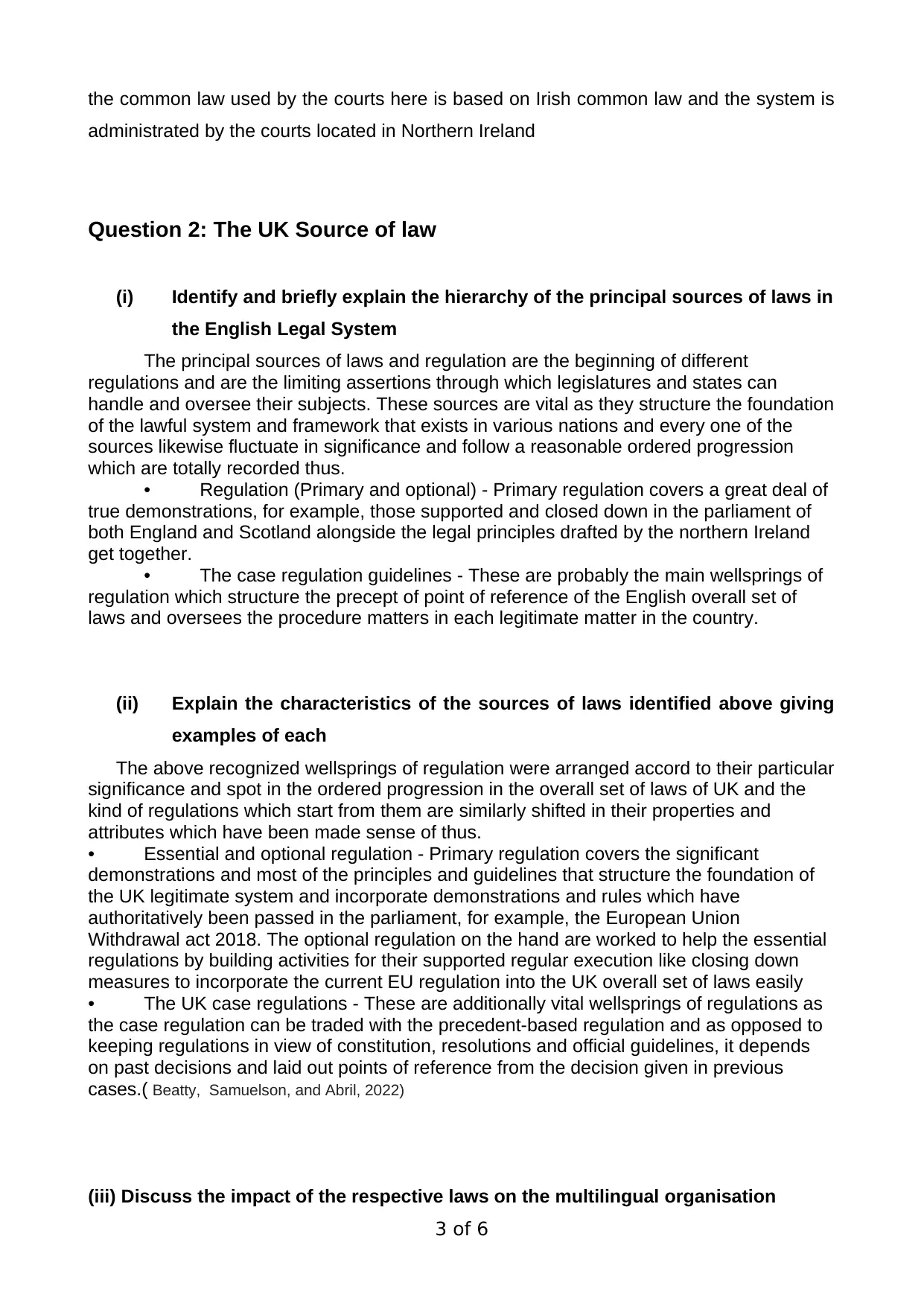
the common law used by the courts here is based on Irish common law and the system is
administrated by the courts located in Northern Ireland
Question 2: The UK Source of law
(i) Identify and briefly explain the hierarchy of the principal sources of laws in
the English Legal System
The principal sources of laws and regulation are the beginning of different
regulations and are the limiting assertions through which legislatures and states can
handle and oversee their subjects. These sources are vital as they structure the foundation
of the lawful system and framework that exists in various nations and every one of the
sources likewise fluctuate in significance and follow a reasonable ordered progression
which are totally recorded thus.
• Regulation (Primary and optional) - Primary regulation covers a great deal of
true demonstrations, for example, those supported and closed down in the parliament of
both England and Scotland alongside the legal principles drafted by the northern Ireland
get together.
• The case regulation guidelines - These are probably the main wellsprings of
regulation which structure the precept of point of reference of the English overall set of
laws and oversees the procedure matters in each legitimate matter in the country.
(ii) Explain the characteristics of the sources of laws identified above giving
examples of each
The above recognized wellsprings of regulation were arranged accord to their particular
significance and spot in the ordered progression in the overall set of laws of UK and the
kind of regulations which start from them are similarly shifted in their properties and
attributes which have been made sense of thus.
• Essential and optional regulation - Primary regulation covers the significant
demonstrations and most of the principles and guidelines that structure the foundation of
the UK legitimate system and incorporate demonstrations and rules which have
authoritatively been passed in the parliament, for example, the European Union
Withdrawal act 2018. The optional regulation on the hand are worked to help the essential
regulations by building activities for their supported regular execution like closing down
measures to incorporate the current EU regulation into the UK overall set of laws easily
• The UK case regulations - These are additionally vital wellsprings of regulations as
the case regulation can be traded with the precedent-based regulation and as opposed to
keeping regulations in view of constitution, resolutions and official guidelines, it depends
on past decisions and laid out points of reference from the decision given in previous
cases.( Beatty, Samuelson, and Abril, 2022)
(iii) Discuss the impact of the respective laws on the multilingual organisation
3 of 6
administrated by the courts located in Northern Ireland
Question 2: The UK Source of law
(i) Identify and briefly explain the hierarchy of the principal sources of laws in
the English Legal System
The principal sources of laws and regulation are the beginning of different
regulations and are the limiting assertions through which legislatures and states can
handle and oversee their subjects. These sources are vital as they structure the foundation
of the lawful system and framework that exists in various nations and every one of the
sources likewise fluctuate in significance and follow a reasonable ordered progression
which are totally recorded thus.
• Regulation (Primary and optional) - Primary regulation covers a great deal of
true demonstrations, for example, those supported and closed down in the parliament of
both England and Scotland alongside the legal principles drafted by the northern Ireland
get together.
• The case regulation guidelines - These are probably the main wellsprings of
regulation which structure the precept of point of reference of the English overall set of
laws and oversees the procedure matters in each legitimate matter in the country.
(ii) Explain the characteristics of the sources of laws identified above giving
examples of each
The above recognized wellsprings of regulation were arranged accord to their particular
significance and spot in the ordered progression in the overall set of laws of UK and the
kind of regulations which start from them are similarly shifted in their properties and
attributes which have been made sense of thus.
• Essential and optional regulation - Primary regulation covers the significant
demonstrations and most of the principles and guidelines that structure the foundation of
the UK legitimate system and incorporate demonstrations and rules which have
authoritatively been passed in the parliament, for example, the European Union
Withdrawal act 2018. The optional regulation on the hand are worked to help the essential
regulations by building activities for their supported regular execution like closing down
measures to incorporate the current EU regulation into the UK overall set of laws easily
• The UK case regulations - These are additionally vital wellsprings of regulations as
the case regulation can be traded with the precedent-based regulation and as opposed to
keeping regulations in view of constitution, resolutions and official guidelines, it depends
on past decisions and laid out points of reference from the decision given in previous
cases.( Beatty, Samuelson, and Abril, 2022)
(iii) Discuss the impact of the respective laws on the multilingual organisation
3 of 6
⊘ This is a preview!⊘
Do you want full access?
Subscribe today to unlock all pages.

Trusted by 1+ million students worldwide
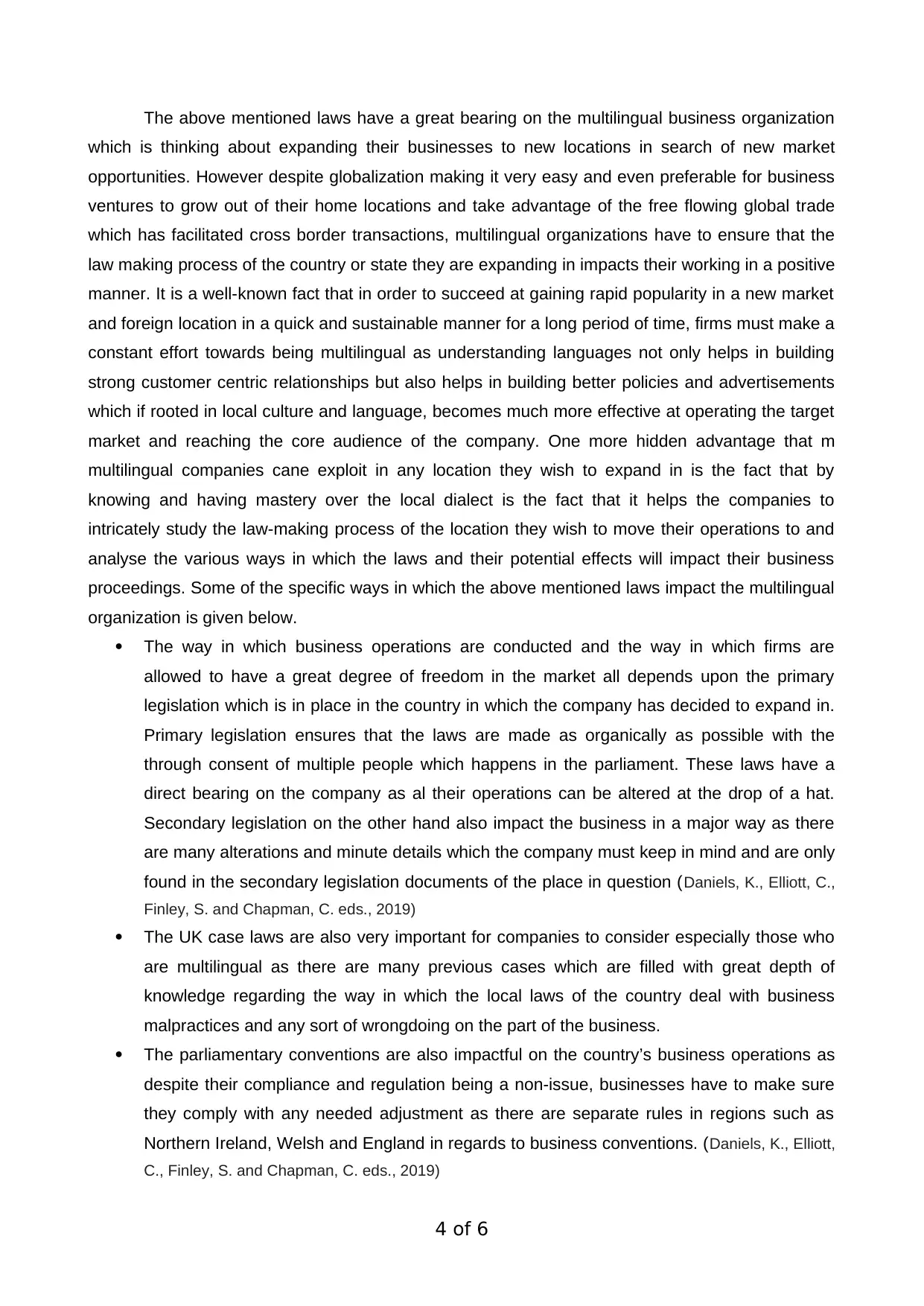
The above mentioned laws have a great bearing on the multilingual business organization
which is thinking about expanding their businesses to new locations in search of new market
opportunities. However despite globalization making it very easy and even preferable for business
ventures to grow out of their home locations and take advantage of the free flowing global trade
which has facilitated cross border transactions, multilingual organizations have to ensure that the
law making process of the country or state they are expanding in impacts their working in a positive
manner. It is a well-known fact that in order to succeed at gaining rapid popularity in a new market
and foreign location in a quick and sustainable manner for a long period of time, firms must make a
constant effort towards being multilingual as understanding languages not only helps in building
strong customer centric relationships but also helps in building better policies and advertisements
which if rooted in local culture and language, becomes much more effective at operating the target
market and reaching the core audience of the company. One more hidden advantage that m
multilingual companies cane exploit in any location they wish to expand in is the fact that by
knowing and having mastery over the local dialect is the fact that it helps the companies to
intricately study the law-making process of the location they wish to move their operations to and
analyse the various ways in which the laws and their potential effects will impact their business
proceedings. Some of the specific ways in which the above mentioned laws impact the multilingual
organization is given below.
The way in which business operations are conducted and the way in which firms are
allowed to have a great degree of freedom in the market all depends upon the primary
legislation which is in place in the country in which the company has decided to expand in.
Primary legislation ensures that the laws are made as organically as possible with the
through consent of multiple people which happens in the parliament. These laws have a
direct bearing on the company as al their operations can be altered at the drop of a hat.
Secondary legislation on the other hand also impact the business in a major way as there
are many alterations and minute details which the company must keep in mind and are only
found in the secondary legislation documents of the place in question (Daniels, K., Elliott, C.,
Finley, S. and Chapman, C. eds., 2019)
The UK case laws are also very important for companies to consider especially those who
are multilingual as there are many previous cases which are filled with great depth of
knowledge regarding the way in which the local laws of the country deal with business
malpractices and any sort of wrongdoing on the part of the business.
The parliamentary conventions are also impactful on the country’s business operations as
despite their compliance and regulation being a non-issue, businesses have to make sure
they comply with any needed adjustment as there are separate rules in regions such as
Northern Ireland, Welsh and England in regards to business conventions. (Daniels, K., Elliott,
C., Finley, S. and Chapman, C. eds., 2019)
4 of 6
which is thinking about expanding their businesses to new locations in search of new market
opportunities. However despite globalization making it very easy and even preferable for business
ventures to grow out of their home locations and take advantage of the free flowing global trade
which has facilitated cross border transactions, multilingual organizations have to ensure that the
law making process of the country or state they are expanding in impacts their working in a positive
manner. It is a well-known fact that in order to succeed at gaining rapid popularity in a new market
and foreign location in a quick and sustainable manner for a long period of time, firms must make a
constant effort towards being multilingual as understanding languages not only helps in building
strong customer centric relationships but also helps in building better policies and advertisements
which if rooted in local culture and language, becomes much more effective at operating the target
market and reaching the core audience of the company. One more hidden advantage that m
multilingual companies cane exploit in any location they wish to expand in is the fact that by
knowing and having mastery over the local dialect is the fact that it helps the companies to
intricately study the law-making process of the location they wish to move their operations to and
analyse the various ways in which the laws and their potential effects will impact their business
proceedings. Some of the specific ways in which the above mentioned laws impact the multilingual
organization is given below.
The way in which business operations are conducted and the way in which firms are
allowed to have a great degree of freedom in the market all depends upon the primary
legislation which is in place in the country in which the company has decided to expand in.
Primary legislation ensures that the laws are made as organically as possible with the
through consent of multiple people which happens in the parliament. These laws have a
direct bearing on the company as al their operations can be altered at the drop of a hat.
Secondary legislation on the other hand also impact the business in a major way as there
are many alterations and minute details which the company must keep in mind and are only
found in the secondary legislation documents of the place in question (Daniels, K., Elliott, C.,
Finley, S. and Chapman, C. eds., 2019)
The UK case laws are also very important for companies to consider especially those who
are multilingual as there are many previous cases which are filled with great depth of
knowledge regarding the way in which the local laws of the country deal with business
malpractices and any sort of wrongdoing on the part of the business.
The parliamentary conventions are also impactful on the country’s business operations as
despite their compliance and regulation being a non-issue, businesses have to make sure
they comply with any needed adjustment as there are separate rules in regions such as
Northern Ireland, Welsh and England in regards to business conventions. (Daniels, K., Elliott,
C., Finley, S. and Chapman, C. eds., 2019)
4 of 6
Paraphrase This Document
Need a fresh take? Get an instant paraphrase of this document with our AI Paraphraser
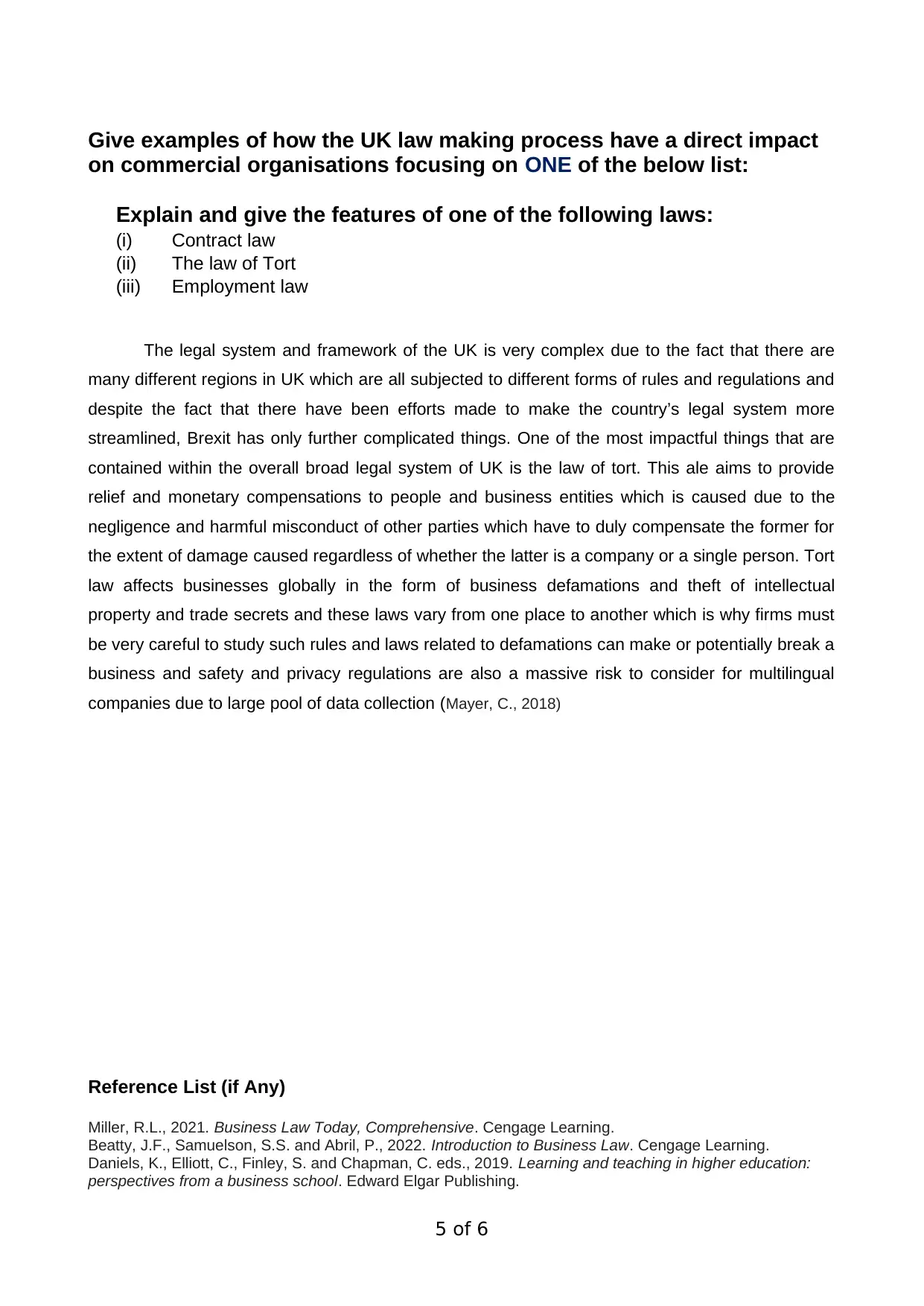
Give examples of how the UK law making process have a direct impact
on commercial organisations focusing on ONE of the below list:
Explain and give the features of one of the following laws:
(i) Contract law
(ii) The law of Tort
(iii) Employment law
The legal system and framework of the UK is very complex due to the fact that there are
many different regions in UK which are all subjected to different forms of rules and regulations and
despite the fact that there have been efforts made to make the country’s legal system more
streamlined, Brexit has only further complicated things. One of the most impactful things that are
contained within the overall broad legal system of UK is the law of tort. This ale aims to provide
relief and monetary compensations to people and business entities which is caused due to the
negligence and harmful misconduct of other parties which have to duly compensate the former for
the extent of damage caused regardless of whether the latter is a company or a single person. Tort
law affects businesses globally in the form of business defamations and theft of intellectual
property and trade secrets and these laws vary from one place to another which is why firms must
be very careful to study such rules and laws related to defamations can make or potentially break a
business and safety and privacy regulations are also a massive risk to consider for multilingual
companies due to large pool of data collection (Mayer, C., 2018)
Reference List (if Any)
Miller, R.L., 2021. Business Law Today, Comprehensive. Cengage Learning.
Beatty, J.F., Samuelson, S.S. and Abril, P., 2022. Introduction to Business Law. Cengage Learning.
Daniels, K., Elliott, C., Finley, S. and Chapman, C. eds., 2019. Learning and teaching in higher education:
perspectives from a business school. Edward Elgar Publishing.
5 of 6
on commercial organisations focusing on ONE of the below list:
Explain and give the features of one of the following laws:
(i) Contract law
(ii) The law of Tort
(iii) Employment law
The legal system and framework of the UK is very complex due to the fact that there are
many different regions in UK which are all subjected to different forms of rules and regulations and
despite the fact that there have been efforts made to make the country’s legal system more
streamlined, Brexit has only further complicated things. One of the most impactful things that are
contained within the overall broad legal system of UK is the law of tort. This ale aims to provide
relief and monetary compensations to people and business entities which is caused due to the
negligence and harmful misconduct of other parties which have to duly compensate the former for
the extent of damage caused regardless of whether the latter is a company or a single person. Tort
law affects businesses globally in the form of business defamations and theft of intellectual
property and trade secrets and these laws vary from one place to another which is why firms must
be very careful to study such rules and laws related to defamations can make or potentially break a
business and safety and privacy regulations are also a massive risk to consider for multilingual
companies due to large pool of data collection (Mayer, C., 2018)
Reference List (if Any)
Miller, R.L., 2021. Business Law Today, Comprehensive. Cengage Learning.
Beatty, J.F., Samuelson, S.S. and Abril, P., 2022. Introduction to Business Law. Cengage Learning.
Daniels, K., Elliott, C., Finley, S. and Chapman, C. eds., 2019. Learning and teaching in higher education:
perspectives from a business school. Edward Elgar Publishing.
5 of 6

Muir, D.M., 2019. How Behavioral Science Ultimately Fails Retirement Savers: A Noble
Experiment. American Business Law Journal, 56(4), pp.707-770.
Penrod, C. and Crow, M., 2018. The Biggest “Have” of Them All: Wal‐Mart and Its Litigation Outcomes in
Slip‐and‐Fall Cases. American Business Law Journal, 55(2), pp.223-259.
Mayer, C., 2018. Prosperity: Better business makes the greater good. Oxford University Press.
The End
6 of 6
Experiment. American Business Law Journal, 56(4), pp.707-770.
Penrod, C. and Crow, M., 2018. The Biggest “Have” of Them All: Wal‐Mart and Its Litigation Outcomes in
Slip‐and‐Fall Cases. American Business Law Journal, 55(2), pp.223-259.
Mayer, C., 2018. Prosperity: Better business makes the greater good. Oxford University Press.
The End
6 of 6
⊘ This is a preview!⊘
Do you want full access?
Subscribe today to unlock all pages.

Trusted by 1+ million students worldwide
1 out of 6
Related Documents
Your All-in-One AI-Powered Toolkit for Academic Success.
+13062052269
info@desklib.com
Available 24*7 on WhatsApp / Email
![[object Object]](/_next/static/media/star-bottom.7253800d.svg)
Unlock your academic potential
Copyright © 2020–2025 A2Z Services. All Rights Reserved. Developed and managed by ZUCOL.




